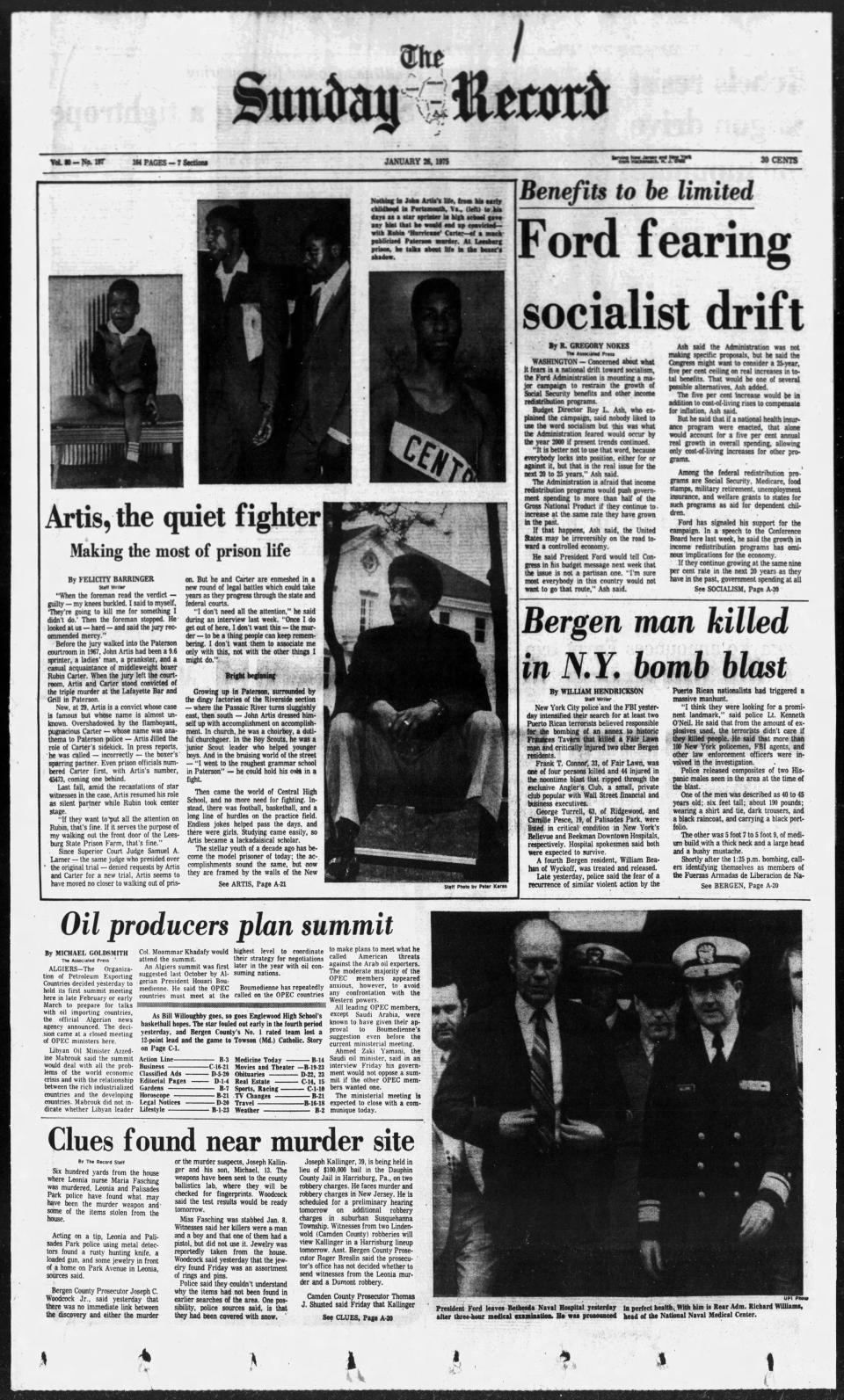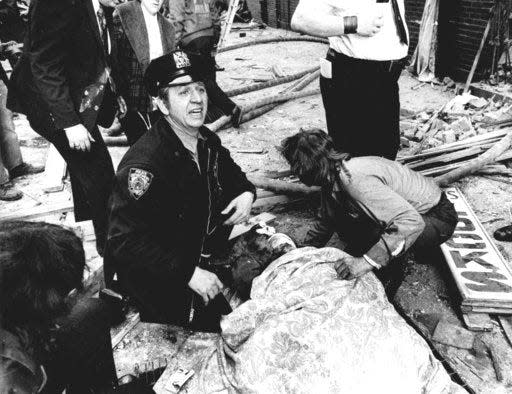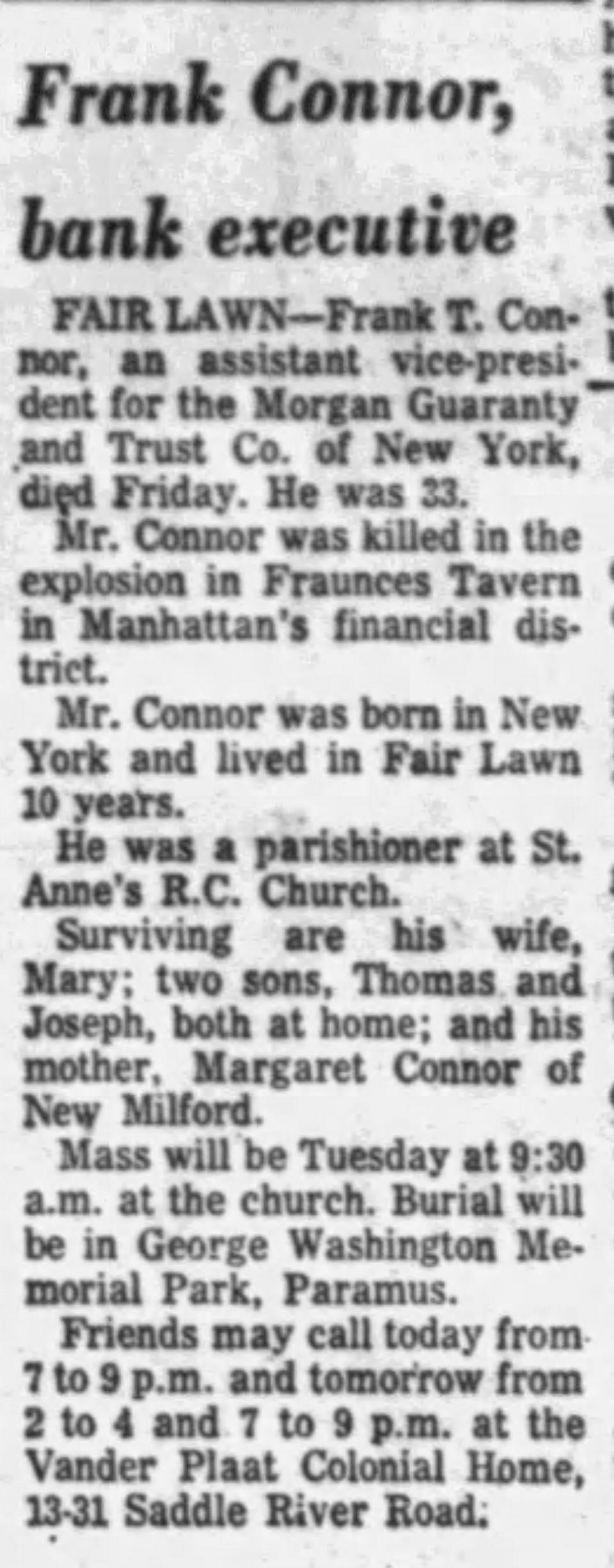This NJ man still cannot forgive the terrorists who killed his father in 1975 | Mike Kelly
Joe Connor has this dream.
He stands face-to-face with an aging man called “Willie.” Connor believes Willie killed his father nearly half a century ago. In Connor's dream, Willie, now 72, finally admits his guilt and apologizes. And Connor finally finds peace in his soul.
But this dream never becomes reality.
Connor's hope for an answer to his father's death has eluded him for 48 years, ever since a bomb, allegedly built by Guillermo “Willie” Morales and planted by Puerto Rican nationalists on a January afternoon in 1975, tore apart the crowded dining room of historic Fraunces Tavern in lower Manhattan.
Four people died — including Joe’s father, Frank Connor, 33, a bank executive — and more than 50 others were injured in what was considered at the time to be one of the worst terror attacks in U.S. history.
Joe Connor has spent most of his life trying to pin the blame on Morales — a quest that continues Wednesday with the debut showing in Hawthorne, New Jersey, of a documentary film about Connor called “Shattered Lives." But Morales remains stridently unrepentant, living under the protection of political asylum in Cuba.
“I never want people to forget my father,” Joe Connor told NorthJersey.com, The Record and the USA TODAY Network in a recent interview. “I felt my father’s life was devalued.”
Terrorism is not just a political statement — not just an attack by radical or even misguided operatives on a nation or against a political and economic system.

Inevitably, it bleeds families.
For many terrorism victims like the Connor family, the pain from those wounds deepens over time, especially when an attack fades into history’s cruel and increasingly silent memory bank. The rest of the world moves on, leaving the victims to wonder why they were singled out and why the pain lingers.
Such is the legacy of the bombing of Fraunces Tavern.
A coordinated campaign of attacks
No one was ever charged in the attack. Few discuss it anymore. But some, including Joe Connor, believe the blame lies at the feet of Morales, then the chief bomb-maker for the secret paramilitary Puerto Rican independence group known as Fuerzas Armadas de Liberacion Nacional Puertorriquena, or FALN.
From 1974 to 1978, the FALN claimed responsibility for more than 50 bombings — all to draw attention to its efforts to create an independent nation in Puerto Rico, which has been a U.S. territory for more than 100 years.
Those bombings were part of a much larger escalation of post-Vietnam anti-war protests that led some leftist groups such as the FALN, the Weather Underground and the Black Liberation Army to move from peaceful demonstrations to violence. In the early 1970s, more than 1,000 bombs — mostly small and non-lethal — were set off across America. One blew up in a bathroom at the U.S. Capitol. Another was set off at the Pentagon.

The FALN’s most notable bombing was Fraunces Tavern, the two-century-old watering hole on Manhattan’s Pearl Street where George Washington delivered his 1783 farewell speech to his fellow officers who led America’s Continental Army to independence from British rule.
The string of FALN bombings largely ended on a July night in 1978 when a pipe bomb that Morales was assembling in an apartment on 96th Street in Queens suddenly blew up.
Morales lost an eye and nine fingers. Only his right thumb remained.
Police took several severed fingers as evidence and charged Morales with a variety of explosives counts. But in a quirk of legal fate, authorities did not charge him with the Fraunces Tavern attack, even though a duplicating machine found in the fire-ravaged Queens apartment was the same one used to produce an FALN statement claiming responsibility for the Fraunces blast.
Seven months later, Morales was convicted and sentenced to 89 years in prison. Three months after that, with the help of a variety of ultra-left revolutionaries including members of the Weather Underground and the Black Liberation Army, he escaped from a prison ward cell in New York’s Bellevue Medical Center.
Morales hid out for a time in an apartment East Orange, New Jersey. Then he secretly made his way to Mexico — reportedly with the help of leftist allies. In 1988, he fled to Cuba, where Fidel Castro offered him political asylum.
He’s been there ever since.
In 2015, this columnist, while on assignment in Cuba, knocked on the door of Morales’s apartment in Havana. Morales refused to answer questions about the Fraunces Tavern attack, yelling through the door that he would call the police unless he was left alone — an irony that obviously escaped him. Back here in America, Morales is still featured on the FBI Most Wanted Terrorists list, with a bounty of $100,000 for his capture.
Mike Kelly, from the archives:Fidel Castro left behind deep wounds in harboring terrorists with NJ ties
More Mike Kelly:Is it time to forgive Sundiata Acoli, the man who killed a NJ state trooper in 1973?
'My father deserved better than that'
Back in New Jersey, Joe Connor wonders how Morales can go on with his life, seeming unruffled by the fact that his explosive handiwork may have killed and injured innocent people during a business lunch at Fraunces Tavern who probably had never heard of the FALN and viewed Puerto Rico as more of a vacation destination and not a flashpoint in leftist politics.
One of the most controversial chapters in the subsequent FALN story occurred when President Bill Clinton in 1999 granted clemency to 16 convicted FALN members — most with ties to New York — just before Hillary Clinton announced that she was running for an open U.S. Senate seat in New York. The clemency was roundly criticized by both houses of a then-divided Congress as a blatant attempt to encourage New York’s Puerto Rican voters to support Hillary Clinton’s campaign.
Hillary Clinton won a Senate seat — with overwhelming support from Puerto Rican voters. The FALN was largely forgotten. But not entirely.
A decade later, the controversy over Morales and the FALN erupted again, as President Barack Obama opened diplomatic doors to Cuba but declined requests by New Jersey Republican Gov. Chris Christie, the FBI and Sen. Bob Menendez, the New Jersey Democrat, to demand the extradition of Morales or other fugitives such as Black Liberation Army operative Joanne Chesimard, who was convicted of murdering a New Jersey state trooper.
A 2022 bill, co-sponsored by Menendez and Sen. Marco Rubio, the Florida Republican, demanding the return of Morales, Chesimard and other fugitives is still weaving its way through Congress. Amid the hyperpartisan politics of the Senate and House, the bill has received little fanfare.
“After 9/11, we went to war to stop the terrorists,” Connor said at one point in a pre-release rendition of “Shattered Lives” viewed by this columnist. “After my father was murdered, we let them out. And you have to think about what that means to families who see that their government feels that their family members had no value. My father deserved better than that.”
The film documents not only the ordeal of Frank Connor’s wife, Mary, and two young sons but also the pain of a cousin from Bergen County who was killed in the collapse of the World Trade Center during the terror attacks of Sept. 11, 2001. It’s one of the few films that trace, over decades, how terrorism affects the lives of ordinary people.
The film’s director and chief writer, Scott Mactavish, said he believes that since 9/11, U.S. leaders have toughened their response in confronting terrorism. The startling exception, Mactavish added, is the fugitives in Cuba.
“I just can't fathom how politicians can let murderers live free, relatively speaking, just 90 miles off our shore,” Mactavish said of the presence of Morales, Chesimard and others in Cuba. “It's all about politics. If a bomber today popped off a device in D.C., killed a congressman and fled to Cuba, the politicians would invade Havana like Omaha Beach to get him back. But not Frank Connor's murderer. It's nauseating, really.”
That theme of personal victim-based outrage dominates much of “Shattered Lives” — just as it has motivated Joe Connor for years to draw attention to his father’s death.
On the night of the Fraunces Tavern bombing, Frank Connor planned to be at home in Fair Lawn to celebrate the birthdays of his sons, Joe and Tom. Frank’s wife, Mary, an Irish immigrant, cooked lasagna for the occasion.

Mary Connor Tully, now 84 and remarried, still lives in Fair Lawn but in a different home and not without the memories of how her life was shattered with the news that her husband would not make it home for that lasagna dinner and birthday celebration.
“What happened to Frank Connor never, ever leaves,” Mary said in an interview. “People say you put it behind you, but that’s baloney. It’s always there. I have the pictures of Frank around my home. I look at them and he always looks young. It’s been many, many years. But at the same time it feels like yesterday.”
Mary said news reports of other terror attacks often bring her back to her own experience with terrorism.
“Every time I hear of another family being devastated, it just brings it all back,” she said. “They have no idea what they are in for. It never leaves."
Morales could not be reached at his home in Cuba. But his American attorney, Ron Kuby, said Morales does not ever plan to return to America to complete his prison sentence — or answer questions about the Fraunces Tavern bombing. In fact, Kuby, who works in New York City and is largely known for representing a string of leftist clients, once the domain of radical attorney William Kunstler, insisted Morales “had absolutely nothing to do” with the attack on Fraunces Tavern.
“He’s not the only guy in the FALN who knew how to make a bomb,” Kuby said. “Given how his last bomb went, I don’t know that he’s in the Phi Beta Kappa of bomb makers.”
Kuby declined to explain why he felt Morales was not involved in the Fraunces attack or who else might have constructed the bomb that was planted there.
Rick Hahn, a retired FBI agent who investigated the FALN along with other terrorist bombings, said no concrete evidence ever emerged to conclusively link Morales to the Fraunces bombing, even though the duplicating machine in Morales’ apartment allegedly produced a statement claiming responsibility for the tavern attack.
Nonetheless, Hahn said the Queens apartment where Morales was found by police without nine of his fingers after a massive explosion was a “bomb making factory” for the FALN.
“I think there is a good chance that Morales at least helped to build that bomb,” Hahn said of the attack on Fraunces Tavern. “But there is no certainty to any of this.”
And so the mystery continues.
Joe Connor hopes the film, which is still in search of a national distributor, will awaken people to the plight of victims of terrorism.
As for Morales, Rich Hahn says that if the former FALN bombmaker returned to America, he might actually be treated better than his life in Cuba.
“If he was extradited back to the United States,” Hahn said, “he’d probably have better health care and better meals in prison than what he gets now in Cuba.”
Mike Kelly is an award-winning columnist for NorthJersey.com as well as the author of three critically acclaimed non-fiction books and a podcast and documentary film producer. To get unlimited access to his insightful thoughts on how we live life in New Jersey, please subscribe or activate your digital account today.
Email: kellym@northjersey.com
This article originally appeared on NorthJersey.com: Frank Connor of Fair Lawn in bombing of Fraunces Tavern documentary

